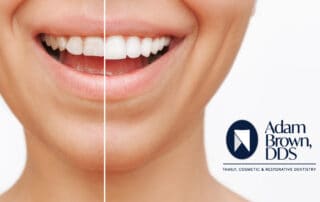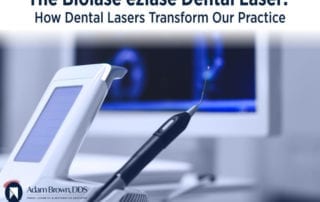Dental Bonding
Dental Bonding at Adam Brown, DDS is a one-trip visit that can improve your pearly whites quick and easy. Dental bonding is used to repair teeth with a tooth-colored resin (stable plastic material) that enhances your smile.
Why Get Dental Bonding
Dental bonding is a very common and easy procedure that dentist do almost every day. A dental bond is a versatile treatment that can solve many different issues involving the teeth. A few reasons for dental bonding include:
- Repairing decayed teeth
- Filling cavities
- Repairing chips/cracks
- Closing space between teeth
- Adding length to teeth
- Altering tooth shape
Advantages of Dental Bonding
The biggest advantage of dental bonding is that it is a cost effective method of cosmetic dentistry. Unlike other treatments, like veneers or implants, dental bonding is a one-stop deal that doesn’t require lab work. Additionally, during dental bonding very little tooth enamel is removed, leaving your teeth strong and healthy.
Disadvantages
The disadvantage to dental bonding is that it does not protect your teeth against stains as well as crowns. It is somewhat stain resistant but it is not stain-proof. Another disadvantage is that dental bonds are not as strong as other treatments, making them last for a shorter period of time.
How Long Does Bonding Last?
The lifespan of bonds depends on two factors.
- How much bonding one has on their teeth.
- A person’s oral habits.
Bonding can last anywhere from three to ten years. Often times they only need a quick touch up to be repaired.
How to Take Care of Dental Bonds?
Taking care of your dental bonds will make them last longer. With dental bonds it is important to clean your teeth very well. This doesn’t require anything abnormal just routine brushing, flossing, and dental visits. This will help increase the lifespan of the dental bonds. It is also important to stay away from chewing ice or other hard materials.




